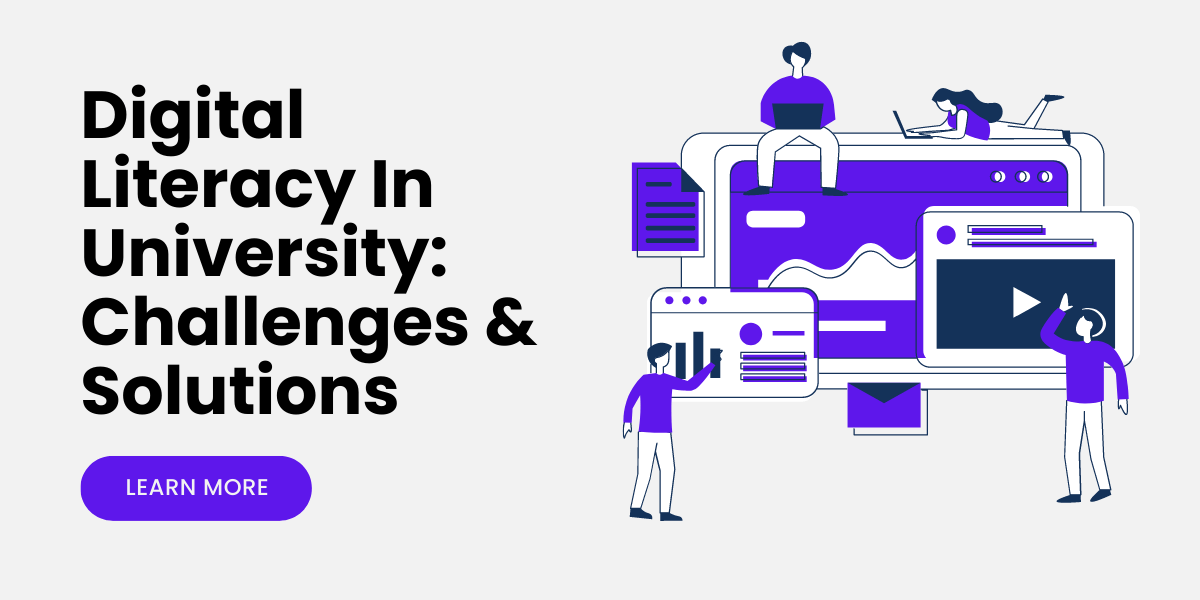Digital Literacy In University: Challenges and Solutions
August 07, 2023
Anis

University students must possess more than academic knowledge to thrive in today's digital age.
Digital literacy is a crucial skill set that empowers them to navigate the ever-evolving digital landscape effectively.
Hence, this article emphasizes the importance of digital literacy among university students and its impact on education, employability, and personal growth.
What Is Digital Literacy?

Image Source: iStock
Due to rapid technological advancements, possessing a wide range of digital literacy skills is crucial for university students.
It is not enough to merely have basic computer knowledge; students must also be able to evaluate and utilize digital technologies effectively.
Now, what does evaluating and utilizing digital technologies mean?
Since we are living in the Industry of Revolution 4.0 era, modern technology (not necessarily hi-tech ones) has become our best and trusted "companion."
Take a look around.
Your friends' eyes are glued to the laptop screen, probably reading important messages from lecturers or group mates on WhatsApp Web.
Or, you can see how "comfortable" students are nowadays searching academic articles via search engines.
Lesser students are coming to the institution's library. Unless the information they searched for is not on the Internet.
Let's be honest. That's an old trick, you know?
So, with the advancement of technologies and the Internet, how do we evaluate and utilize the authenticity of the information given?
Some students will re-confirm it with their classmates or lecturers. Or, they set up a discussion meeting with their group mates.
It sounds like a student-wise method, right?
With all these advancements, technology, the Internet, and devices, students are encouraged to do a lot of reading.
They must gather information from books, the Internet, news, and academic papers.
Plus, having real-life conversations with professionals is also a helpful guide.
Not everyone prefers this way, but you know that you (students) need to touch some grass occasionally.
These suggestions could be exhausting or a new experience for them. Either way that is the perk of being a university student.
Developing competencies in information literacy, media literacy, digital communication, critical thinking, and data analysis is essential for success.
By becoming digitally literate, students can leverage technology to their advantage for learning, collaborating, or problem-solving.
Role of Digital Literacy in Education
Digital literacy is an absolute necessity in higher education.
Students must effectively utilize various digital resources, conduct thorough research online, communicate with peers virtually, and participate actively in e-learning platforms.
Digital tools are also essential for students to personalize their learning experiences, access current information, and broaden their perspectives.
Additionally, developing digital literacy fosters critical thinking skills as students learn to evaluate sources, distinguish credible information, and think analytically.
Digital Literacy Challenges
Having digital literacy skills is crucial in today's interconnected world.
However, numerous challenges can hinder people from developing and utilizing these skills, including:
1. Technology and connectivity access
Developing digital literacy faces a significant challenge due to limited access to technology devices and reliable internet connectivity.
This challenge is particularly severe in underserved or rural areas where resources are unequally distributed, further widening the digital divide.
One must strive to provide equal access to technology infrastructure to overcome this gap.
It can be achieved by establishing community centers, offering subsidized devices, and expanding broadband connectivity.
2. Outdated technology
Staying on top of the ever-changing technological landscape is burdensome, especially when maintaining digital literacy skills.
Staying ahead is a constant struggle, with new tools, platforms, and software constantly emerging at a breakneck pace.
To succeed in the digital world, you must seek education and growth opportunities with easy-to-use training materials to acquire essential skills.
3. Overload/ misinformation
In today's digital world, relying on the Internet for information can be daunting, given the vast amount of data available.
Developing critical thinking skills and evaluating sources is crucial to counter misleading information.
Schools must prioritize teaching media literacy to empower students to navigate the digital world effectively.
4. Language barriers

Image Source: iStock
Poor language skills can make it hard to access digital content, especially if it's in a foreign language.
To address this problem, providing resources in multiple languages, customizing content for each region, and offering language assistance services are crucial.
Establishing digital literacy education from a young age can also help individuals overcome language and literacy barriers.
5. Digital inequality
Socioeconomic inequalities cause the digital divide and limit marginalized communities' access to technology.
Governments, organizations, and educational institutions must prioritize initiatives that bridge this gap.
To make technology accessible, we must ensure affordability, wider internet availability, and education in resource-limited communities.
6. Digital privacy/ security
To stay safe online, learning about protecting privacy, securing data, and responsible digital behavior is important.
Education on these topics should include privacy awareness, safe practices, and digital ethics to make informed decisions and protect personal information.
7. Technophobia
Some individuals may resist change or harbor technophobia, impeding their willingness to engage with digital tools and learn digital literacy skills.
Targeted interventions are necessary to address fears, foster nurturing environments, and promote the benefits of digital literacy.
Encouraging peer learning, mentorship programs, and user-friendly interfaces can help alleviate anxieties and promote digital empowerment.
How To Overcome The Challenges?
1. Continuous professional development

Image Source: iStock
Students, lecturers, or individuals working for educational institutions and organizations must be provided with frequent professional development opportunities.
By doing so, they can stay up-to-date with the latest digital tools, trends, and skills.
2. Digital literacy education
Incorporating media literacy and critical thinking skills in educational curricula at all levels is imperative.
It is the only way for students to master assessing sources, identifying biases, and critically analyzing information.
3. Multilingual content & resources
To ensure our resources are accessible, we will produce educational content, tutorials, and digital materials in various languages, including those commonly spoken by our target audience.
It is a crucial step toward promoting inclusivity and accessibility.
In a nutshell, digital literacy is an indispensable skill set for university students.
It is helpful by equipping them with the tools to excel academically, enhance employability, and navigate the digital landscape confidently.
Universities must acknowledge the importance of digital literacy and take necessary measures to encourage its growth. It will enable their students to excel in the digital era.
By embracing digital literacy, students can enrich their educational journey, hone their analytical skills, and actively participate in the digital revolution.
A firm grip on digital literacy can assist university students in realizing their academic and professional objectives while nurturing their personal development.
You might be interested in...
- Top Private Universities in Malaysia (QS Rankings 2026)
- APU and GUT Launch New Tech College in China: Earn Dual Degrees
- Global Learning at the Crossroads: Canada–Malaysia’s Evolving Education Partnership
- How AI is Powering the Next Wave of MSME Growth in Malaysia
- Malaysian Private Universities Making a Mark in Global Rankings
- Benchmarking Malaysian Private Universities Against Their ASEAN Peers
- Fastest-Rising Malaysian Universities in the QS Rankings (2023‑2025)
- Sunway University Climbs to Global Top 500 in QS Rankings 2026
- Trusted by Top Universities: EasyUni’s Exclusive Visit to Sunway University
- Wawasan Open University and Sophic Automation Partner to Offer Work-Based Learning for Engineering Students
 +60173309581
+60173309581





